- Home
- Various Authors
Mortal Crimes 1 Page 11
Mortal Crimes 1 Read online
Page 11
“How long have you owned the property?”
“Three weeks.”
“Three weeks?”
“Officially. I inherited the property from my grandfather.”
Laura asked him how long his grandfather had owned it. Thirty-seven years, until his death a month ago at the age of ninety-five. He had been in an Alzheimer’s home for almost a year before he died.
“Do you spend a lot of time here?”
“Haven’t been up here in at least ten, twelve years. Since I moved to LA and came back.”
“How long were you in LA?” Laura asked.
“I was there for most of the nineties, came back in two thousand.”
“Why didn’t you come up here?” Laura motioned to the window. “If I had a cabin, I’d be up here all the time.”
“I don’t know. I just didn’t. My work with USGS takes me all over.” He leaned forward, hands clasped on his knees. “But that’s not really it. It’s hard to explain. It wasn’t the same with my grandfather not here. I didn’t want to … I felt it was disloyal to him being up here.” He cleared this throat, his eyes going back to Jaime. “I’m not explaining this very well. All the good times I spent up here when I was a kid, my grandfather was a big part of it. It was just too sad.”
“But now you own the property.”
He rubbed his nose. “It seems … I don’t know … cleaner. He’s gone, he died just as we all will, and now I can think of the cabin as mine. Mine and my sisters’.”
Laura understood that. “You share this property with your sisters?”
“No. He left the cabin to me. I’m the only one living in Tucson, and he wanted whoever inherited it to get their use out of the place. But he made sure they were taken care of. My sister Danielle has his house in Laguna. If either of my sisters ever wants to come back here, they can stay here whenever they want.”
“When you were in LA in the mid-nineties, did you ever come back for a visit?”
“A couple of times.” He added, “I’m pretty sure I didn’t come up here, though. If I came to town at all, it was usually for the weekend. We wouldn’t have the time.”
“How about the summer of 1997? Did you come to Tucson during that time span?”
“I honestly can’t remember.”
“Could you think about it and let us know?”
He nodded.
“Are there any other cabins close by?”
“The nearest cabin is probably half a mile over that hill,” he said, pointing behind him.
Laura followed the direction of his hand—north—which would put that cabin closer to Camp Aratauk.
“Do you know who the cabin belongs to?”
He shook his head. “I’m just getting to know people up here.”
“What kind of car did you have in 1997?”
“’97?” He thought about it. “I had a GMC truck. Why?”
His eyes leveled on her. Laura met him halfway. “We’re asking everybody we interview that.”
“Have you interviewed anybody else?”
That made her smile. “You’re the first.” She glanced down at her flip-top notebook. “What about your grandfather? What kind of car did he have?”
He rubbed his jaw. “That would be his last car—he had it until he went to … Palmcrest Village. It was a white Chrysler.”
Out of the corner of her eye, Laura noticed Jaime sit a little straighter. “Did you ever drive it?”
“Sure, when I’d come out here. If I flew in, and even when I didn’t. He liked me to drive his car—said it saved me wear and tear on mine.”
He continued to meet her eyes, almost as if he were trying to prove some kind of point. Again she got the feeling that he knew a lot more than he was saying.
“Can you get me the paperwork on it? Who your grandfather sold it to?”
“I think I can do that, yes.” His look wary.
She handed him her card, and they made small talk as he escorted them out.
“What do you think?” Jaime asked as they walked back up to the excavation.
“What he said was plausible enough.”
“The geology stuff? Yeah, but he could have been making it all up, for all we know.”
“That occurred to me.”
Jaime shook his head. “The one girl’s bones being found down in the valley, and then three days later, he digs up this skeleton? That sure sends off warning bells in my head.”
Laura agreed, but said, “We don’t know if it is Jenny Carmichael.”
“Oh, it is. Not to mention,” Jaime added, grabbing a ponderosa sapling to help him negotiate a tough spot in the trail, “Micaela Brashear comes home six months ago. All that time these kids have been gone, and now they’re popping up like mushrooms after a rain. And his grandfather had a white car. He could have driven up here for the weekend. Can’t you just picture him in his grandfather’s car, talking to that little girl over by Rose Canyon? I can.” Jaime jerked his head in the direction of the cabin. “You ask me, Mr. Rockhound in there is the prime suspect. Probably has a guilty conscience, and when he heard about Kristy Groves on the news, it triggered something in him.”
“Could be. But what about Bill Smith?”
“What about him? I don’t know, maybe Lawson’s only good for these two. The Brashear girl’s abduction could be unrelated.”
Laura thought about the missing girl, Lily. And Jaime’s own theory that there couldn’t be two serial killers working in the same area at the same time—it defied the odds. “That would be a huge coincidence.”
He shrugged. “We’ve got coincidences any way you slice it.” He glanced back at the cabin. “But that’s the guy who dug up Jenny Carmichael.”
________
The lights were blinding; the generator snorted and growled and gave off gas fumes; and bugs zipped and lighted on them as they watched the excavation grow slowly. The grave had been widened and deepened according to its place on the grid. The rectangle had been divided into thirds, each area marked off by yellow string. It was slow work. Two assistants sifted the earth into buckets.
Many of the bones had been disarticulated, but the grave was deep enough that they were all pretty much in the same place. Strands of dirty, blond hair clung to what was left of the scalp and the brown skull. The clothing was degraded and missing in places, but it was there. Mud-colored, but Laura recognized the canvas uniform shorts and the navy piping around the collar of the camp shirt. And the belt, which lay almost entwined with the rubberized portions of the girl’s underwear. Laura knew the uniform because she had once worn it herself. A shiver ran up her back as she thought about that.
From the placement of the bones and clothing, it appeared that the girl might have been fully-clothed—including hiking boots and socks on her feet.
Jean Cox had already matched the dental charts to the tiny skeleton’s teeth by the time they got back to the site.
They had indeed found Jenny Carmichael. She’d come a long way from Rose Canyon Lake.
Laura was aware of movement down by the cabin below. Steve Lawson coming up the hill, light glinting off his gold rims.
He stopped just short of the lit area, hands in his pockets. Laura was aware of his presence, his stillness, and found herself thinking two ways about him. He could be the guy who just continued digging where his dog had left off, or he could be the guy who killed Jenny.
Lawson was an enigma. Laura found herself liking him, but was bothered by the fact that he had managed to dig right in the spot where a little girl was buried. What were the odds of that happening?
She was sure he was holding something back. He didn’t act guilty, but she knew that guilt wasn’t always an indicator of behavior. Look at Sean Grady.
Now he hung back at the edge of her vision outside the crime scene tape, making sure he wasn’t a nuisance. His property—he had a right to be on it. So quiet, at the edge of the light, that everybody seemed to forget about him.
Everybody except
her.
It got cold toward dawn. Laura went down to the Yukon and got herself a jacket and another bottle of water. She was stiff and sore, and the small of her back hurt a little. She’d spent most of her time leaning against a pine-tree trunk or in a catcher’s position.
Jaime had long ago sat down against a rock and drifted off to sleep. Jean Cox, who was energized by a scene like this, was at her best. The work was painstaking, but she was efficient and gentle, making certain each piece of recovered bone was placed carefully inside the body bag.
Laura looked at her watch under the door light of the Yukon. Four-fifteen. Most of the skeleton had been recovered, and a coroner’s van was awaiting transport, two men leaning against its doors, talking quietly and smoking.
She headed down the mountain. She wanted to be at the Carmichael house early, before Mrs. Carmichael woke up. The local news came on at six o’clock in the morning, and Laura knew there would be a reference to the bones found on Mt. Lemmon. She wanted to be the one to tell Mary Carmichael—if she didn’t know already.
She parked outside Mrs. Carmichael’s house while it was still dark, waiting for a light to go on.
The lights were off, but Laura wondered if Mary Carmichael was really sleeping. She might be sitting there in the dark, thinking about the loss of her son. If she was sleeping, Laura didn’t want to wake her. She knew what it was like to awaken to a terrible void, to realize in the first moments of waking that her life would never be the same again.
A mockingbird sang from the immense wall of oleanders lining the front yard.
Laura wondered if Mrs. Carmichael had accepted the probability that Jenny was dead. Probably not completely—there was always that slim hope that somehow her child would come back to her. Especially in light of the Brashear family’s miracle.
But Laura knew that Mary Carmichael would take one look at her on her doorstep and she would know. She would then be forced to carry the weight of two deaths instead of one. But at least Laura would be bringing Jenny home. She’d be bringing Jenny Carmichael home, and finding Jenny led her that much closer to her killer.
Laura vowed that she would find him.
As the day lightened, Laura looked at the house. There was no gold star, but an American flag hung like a curtain in the center of the picture window. It gave Laura an empty feeling.
A light snapped on in the house just after six thirty. Laura left the Yukon and started up the walk. The door opened before she got there. Mary Carmichael standing in the doorway, the place dark behind her. She was dry-eyed, but Laura had been right. Mary Carmichael knew why she was there.
“I just saw it on the news. It’s Jenny, isn’t it?”
“Yes, ma’am. We have a positive ID.”
“You used the dental records.” It was not a question. “Why don’t you come in? I have coffee.”
Mary Carmichael’s voice was matter-of-fact. Laura knew she had been living with the idea of Jenny’s death for eleven years, but she’d expected more emotion than this. Especially this week—with her only other child dead in Afghanistan. Maybe she was so put-together to keep from falling apart.
Mary Carmichael led her into a dark kitchen, the sun casting stripes through the venetian blinds.
“Sit down. Do you take cream? Sugar?” Her matronly figure negotiating the cramped kitchen adroitly.
“Cream’s good, thanks.”Laura then introduced herself.
“We’ve met before at some function or another.”
Laura nodded, accepting a mug that had the initials of Carmichael’s organization on it: Survivors of Homicide. “I wanted to say how sorry I am about your loss.”
“I can’t even…” She sat down opposite Laura. “I want to concentrate on Jenny. They’re sure it’s her?”
Laura nodded.
“They said on the news that she was buried not far from the camp. Is that true?”
Laura estimated in her head from her own memory of the camp. “About a mile or so.”
“So she wasn’t at the lake. It sounds like she never left the camp.”
“That could be. Or someone offered to drive her back there…” Laura paused. It was the only way the man and the car figured in. If he had driven her back to the camp. But after that, it fell apart. Why was Jenny found over a mile from Camp Aratauk? Did they walk there? It was certainly possible, but it felt wrong.
“Does the ME have a cause of death?” Mary Carmichael asked. “I suppose they can’t tell much. She’d just be bones by now. It amazes me that both those girls have been found within a week … why do you think that is?”
Laura cleared her throat. “I don’t know.”
Mary Carmichael gripped her coffee mug tightly and looked across the table at Laura. “What do you know? You can tell me. I’ve waited eleven years.”
Laura decided to go with the facts. Mary Carmichael could read what she wanted to into it. “When I left, it didn’t appear that there was any obvious cause of death—“
“No blow to the skull. Or gunshot wound. Nothing like that?”
“No.” Laura paused. She wanted to tell Mary Carmichael that it was possible that Jenny had been buried fully clothed, but that determination could only be made by the forensic anthropologist after the autopsy. Instead she said, “There was a book buried with her.”
“A book?”
“The Man in the Moon.”
“She loved that book—all of them. The first one was her favorite, but she had all the books in the series. She must have been reading it. What do you think?”
Once again, Laura had to say she didn’t know. It was frustrating. The idea of a man meeting Jenny and offering to drive her back to camp—that could have happened. The idea of them walking over a mile away together, less likely, but still plausible. It was also possible he had killed her near the camp and took her far enough away to bury her where no one would find her.
But why take the book?
“I want to help you as much as I can,” Mary Carmichael said. “I wrote everything down—everything that happened. What the detectives told me. I have photos, too. Pictures from the camp, and my niece took photos on the grid search. You’re free to look at everything. I gave copies of all this information to Detective Schiller, but I don’t think he used it. I’ve got two boxes. Would you like to see them?”
Laura realized that Mary Carmichael had been building up to this.
She thought of the cut-and-dried case file. Detective Schiller had made no mention of the material Mary Carmichael had given him. Not in the original book, not in the half-dozen supplementary reports.
“I absolutely want to see them,” Laura said.
CHAPTER FIFTEEN
Back at DPS, Laura looked through Mary Carmichael’s material. There were a few photos of Jenny at camp. She was such a pretty little girl, her gaze forthright and serious. But there were times when she smiled and laughed: a water fight, at a picnic, the day she won first prize in the archery competition.
Someone—Mary Carmichael?—had written the names of the girls under their pictures. Most of the photos, though, showed Jenny with another girl, a sad-faced child battling baby fat, dark-haired and wan. This girl had to be Jenny’s “best friend,” Dawn Sayles.
Detective Artie Schiller had interviewed Dawn Sayles. Laura located the report.
The day they’d gone to the lake, Dawn and Jenny had explored along the water. By lunch time, they’d split up; Dawn had gone back for the picnic and Jenny had continued to explore the area.
After lunch, the thunderstorm had hit, and all the girls had been shepherded into the van.
Laura remembered several interviews from the case file narrative that corroborated Dawn’s story. It appeared Jenny had been a true explorer, as Laura herself had been as a child. Always going off by herself, always lured on by whatever lay beyond the bend in the road. Just the kind of girl who would be vulnerable to a predator.
Laura went through the case file, looking for the camp counselor’s stateme
nt: Sherri D’Agnostino was sure that Jenny had been on the van when they’d driven back to the camp.
Which meant that Jenny could have gone off by herself later in the day. Laura would have to reinterview both Jenny’s friend Dawn and Sherri D’Agnostino.
She was leafing through photographs of the Mt. Lemmon grid search when her phone rang. It was Dave Toch. “I wanted to catch you up on the Grady investigation. We picked him up a block away from his house.”
When a TPD patrol officer drove to the house, Grady’s Hummer was out front. Sean Grady had gone straight home.
The officer knocked, but got no answer. Toch ordered a surveillance unit to sit off the house. About five minutes after the patrol officer left, Grady came out and drove off. He was stopped and arrested before he got out of the neighborhood. “We searched Grady’s vehicle for a knife, but didn’t find it.”
Laura had described the hunting knife in great detail yesterday. A big knife. Police were allowed to search any place that could conceal the knife, so when she described it for Toch yesterday, its dimensions might have increased a little. Okay, a lot.
With probable cause to search Grady’s house, they’d found the knife stashed in a bedroom closet “along with some coke,” Toch said.
Laura knew what this meant. They could get a new warrant to search any area large enough to conceal coke—which meant they would be allowed to search every corner of the house.
“Turns out he had a nice little cottage industry going—dealing coke. The prosecutor likes that part of the case.”
“Who’s the prosecutor?”
“Jimmy Rutan.”
“What about the assault?”
“He’s more interested in working out a plea on the coke possession, see who else he can get.”
“Shit.”
“That’s not gospel. I’m just warning you. Besides, it’s not looking all that cut-and-dried.”
“What do you mean?”
“I just interrogated this guy, and he’s good. He almost convinced me.”
Laura’s pulse sped up. “What’d he say?”

 Lady Ambleforth's Afternoon Adventure by Ann Lethbridge, Barbara Monajem, Annie Burrows, Elaine Golden, Julia Justiss and Louise Allen
Lady Ambleforth's Afternoon Adventure by Ann Lethbridge, Barbara Monajem, Annie Burrows, Elaine Golden, Julia Justiss and Louise Allen Gods & Mortals
Gods & Mortals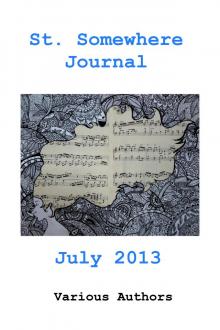 St. Somewhere Journal, July 2013
St. Somewhere Journal, July 2013 firstwriter.com First Short Story Anthology
firstwriter.com First Short Story Anthology Warcry: The Anthology
Warcry: The Anthology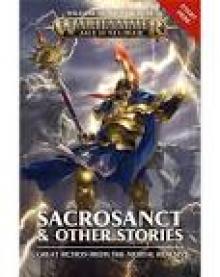 Sacrosanct & Other Stories
Sacrosanct & Other Stories Ultimate Heroes Collection
Ultimate Heroes Collection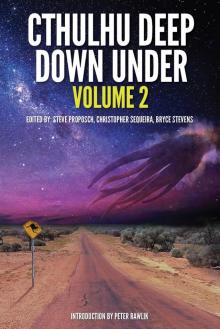 Cthulhu Deep Down Under Volume 2
Cthulhu Deep Down Under Volume 2 Erotic Classics II
Erotic Classics II Dynasties: The Elliotts, Books 1-6
Dynasties: The Elliotts, Books 1-6 Dynasties:The Elliots, Books 7-12
Dynasties:The Elliots, Books 7-12 International Speculative Fiction #4
International Speculative Fiction #4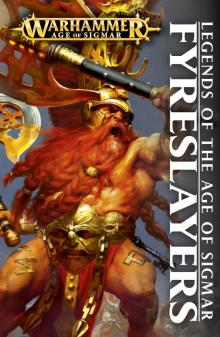 Fyreslayers
Fyreslayers One Night In Collection
One Night In Collection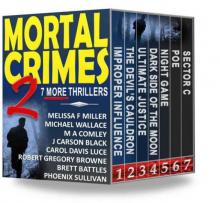 Mortal Crimes 2
Mortal Crimes 2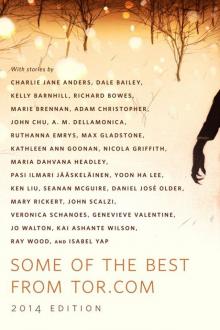 Some of the Best from Tor.com
Some of the Best from Tor.com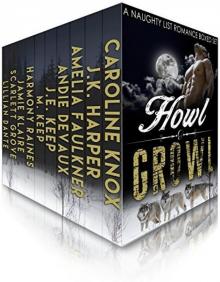 Howl & Growl: A Paranormal Romance Boxed Set
Howl & Growl: A Paranormal Romance Boxed Set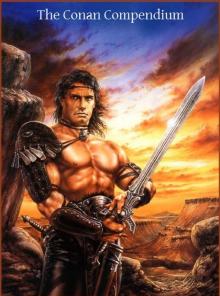 The Conan Compendium
The Conan Compendium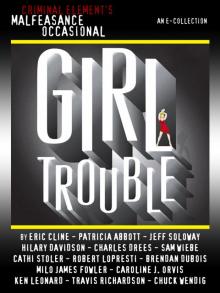 The Malfeasance Occasional
The Malfeasance Occasional Brides of Penhally Bay - Vol 4
Brides of Penhally Bay - Vol 4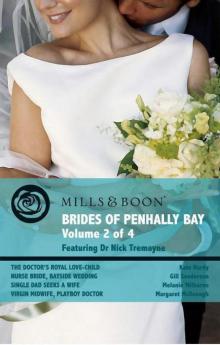 Brides of Penhally Bay - Vol 2
Brides of Penhally Bay - Vol 2 Brides of Penhally Bay - Vol 1
Brides of Penhally Bay - Vol 1 School's in Session
School's in Session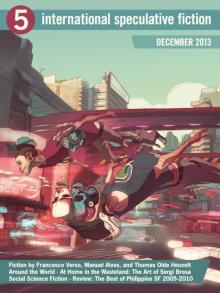 International Speculative Fiction #5
International Speculative Fiction #5 Erotic Classics I
Erotic Classics I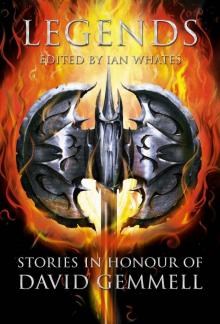 Legends: Stories in Honor of David Gemmell
Legends: Stories in Honor of David Gemmell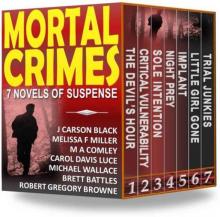 Mortal Crimes 1
Mortal Crimes 1 The Classic Children's Literature Collection: 39 Classic Novels
The Classic Children's Literature Collection: 39 Classic Novels Don't Read in the Closet volume one
Don't Read in the Closet volume one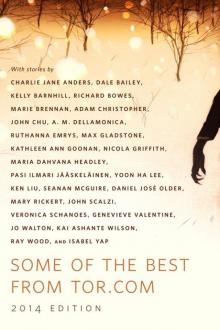 Some of the Best from Tor.com: 2014: A Tor.Com Original
Some of the Best from Tor.com: 2014: A Tor.Com Original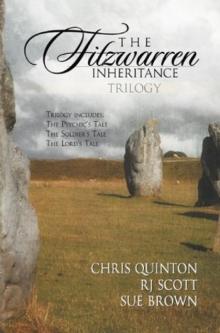 The Fitzwarren Inheritance
The Fitzwarren Inheritance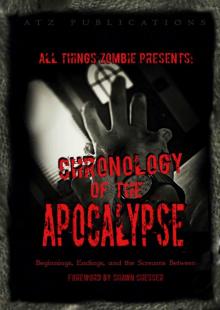 All Things Zombie: Chronology of the Apocalypse
All Things Zombie: Chronology of the Apocalypse Hammer and Bolter - Issue 12
Hammer and Bolter - Issue 12 Kiss Kiss
Kiss Kiss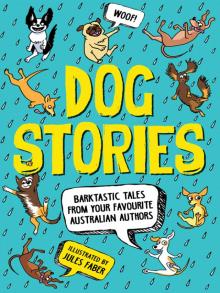 Dog Stories
Dog Stories Bad Blood Collection
Bad Blood Collection